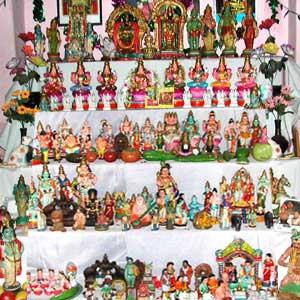Navaratri Festival In Kerala
Navaratri, literally meaning nine nights is one among the main festivals celebrated in God's own country. This auspicious festival is considered as a time period for beginning works and studies. Koluveipu, adachu pooja and pooja edupu are some among the notable features of Navaratri festival in Kerala.

Navaratri festival, depicting the historic victory of good over evil is one among the important festivals celebrated in Kerala. According to mythology, this festival is made to worship the goddesses Durga, Lakshmi and Saraswathi as three different forms of single cosmic energy. Word Navaratri literally meaning 'nine nights' is considered as a time period of poojas.
In Kerala, navaratri is mainly celebrated as as Saraswathi pooja and ayudha pooja. At this time, all studies and works which required skills are suspended. Some among the food offerings given to goddess Saraswathi Devi during pooja time period include roasted paddy, beaten rice and jaggery. Last three days of navaratri, namely ashtami, navami and dashami are considered to be very important in navaratri festival.
Mahanavami is one among the auspicious days in navaratri pooja holidays. During this particular day of navaratri, pooja is performed both in the morning and in the evening so as to receive blessings from goddess. Tenth day of navaratri festival is taken as the day for beginning studies and work. It is particularly known in the name of vidhyarambham. This tradition is usually done when the child reaches three or five years old. Here the child is made to write 'Hari shri ganapathaye namaha' on raw rice with his right finger. Usually the father of child or a great teacher will officiate this ceremony. Koluveipu is another notable feature of navaratri festival in Kerala. It is done only by a particular community group of Kerala. Here, images of gods, animals and toys are arranged in the form of a exhibition manner.

 Job oriented
Job oriented